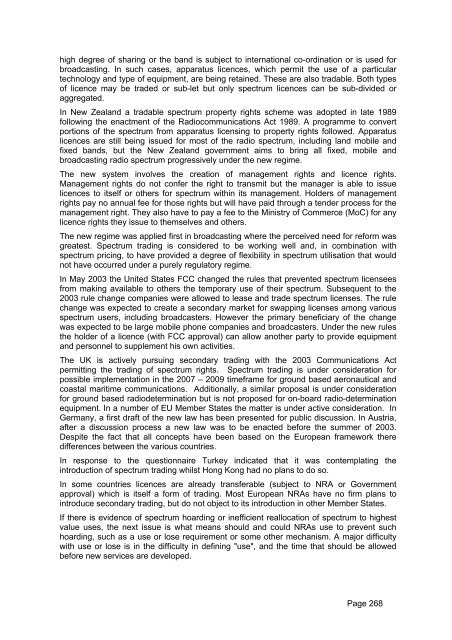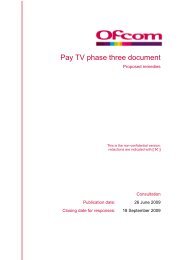FINAL REPORT - Stakeholders - Ofcom
FINAL REPORT - Stakeholders - Ofcom
FINAL REPORT - Stakeholders - Ofcom
You also want an ePaper? Increase the reach of your titles
YUMPU automatically turns print PDFs into web optimized ePapers that Google loves.
high degree of sharing or the band is subject to international co-ordination or is used for<br />
broadcasting. In such cases, apparatus licences, which permit the use of a particular<br />
technology and type of equipment, are being retained. These are also tradable. Both types<br />
of licence may be traded or sub-let but only spectrum licences can be sub-divided or<br />
aggregated.<br />
In New Zealand a tradable spectrum property rights scheme was adopted in late 1989<br />
following the enactment of the Radiocommunications Act 1989. A programme to convert<br />
portions of the spectrum from apparatus licensing to property rights followed. Apparatus<br />
licences are still being issued for most of the radio spectrum, including land mobile and<br />
fixed bands, but the New Zealand government aims to bring all fixed, mobile and<br />
broadcasting radio spectrum progressively under the new regime.<br />
The new system involves the creation of management rights and licence rights.<br />
Management rights do not confer the right to transmit but the manager is able to issue<br />
licences to itself or others for spectrum within its management. Holders of management<br />
rights pay no annual fee for those rights but will have paid through a tender process for the<br />
management right. They also have to pay a fee to the Ministry of Commerce (MoC) for any<br />
licence rights they issue to themselves and others.<br />
The new regime was applied first in broadcasting where the perceived need for reform was<br />
greatest. Spectrum trading is considered to be working well and, in combination with<br />
spectrum pricing, to have provided a degree of flexibility in spectrum utilisation that would<br />
not have occurred under a purely regulatory regime.<br />
In May 2003 the United States FCC changed the rules that prevented spectrum licensees<br />
from making available to others the temporary use of their spectrum. Subsequent to the<br />
2003 rule change companies were allowed to lease and trade spectrum licenses. The rule<br />
change was expected to create a secondary market for swapping licenses among various<br />
spectrum users, including broadcasters. However the primary beneficiary of the change<br />
was expected to be large mobile phone companies and broadcasters. Under the new rules<br />
the holder of a licence (with FCC approval) can allow another party to provide equipment<br />
and personnel to supplement his own activities.<br />
The UK is actively pursuing secondary trading with the 2003 Communications Act<br />
permitting the trading of spectrum rights. Spectrum trading is under consideration for<br />
possible implementation in the 2007 – 2009 timeframe for ground based aeronautical and<br />
coastal maritime communications. Additionally, a similar proposal is under consideration<br />
for ground based radiodetermination but is not proposed for on-board radio-determination<br />
equipment. In a number of EU Member States the matter is under active consideration. In<br />
Germany, a first draft of the new law has been presented for public discussion. In Austria,<br />
after a discussion process a new law was to be enacted before the summer of 2003.<br />
Despite the fact that all concepts have been based on the European framework there<br />
differences between the various countries.<br />
In response to the questionnaire Turkey indicated that it was contemplating the<br />
introduction of spectrum trading whilst Hong Kong had no plans to do so.<br />
In some countries licences are already transferable (subject to NRA or Government<br />
approval) which is itself a form of trading. Most European NRAs have no firm plans to<br />
introduce secondary trading, but do not object to its introduction in other Member States.<br />
If there is evidence of spectrum hoarding or inefficient reallocation of spectrum to highest<br />
value uses, the next issue is what means should and could NRAs use to prevent such<br />
hoarding, such as a use or lose requirement or some other mechanism. A major difficulty<br />
with use or lose is in the difficulty in defining "use", and the time that should be allowed<br />
before new services are developed.<br />
Page 268
















